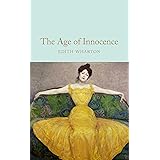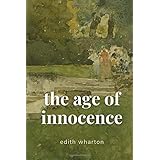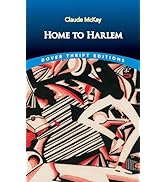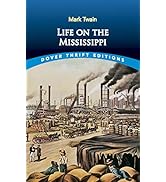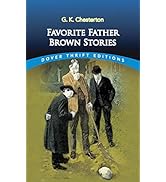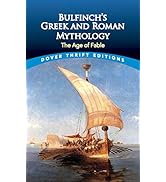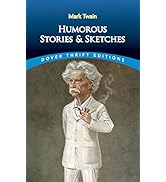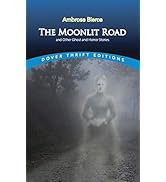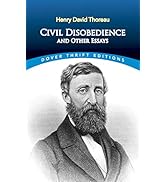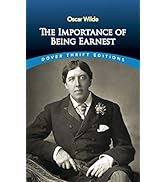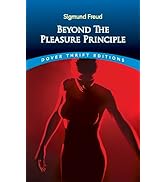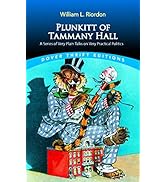
Enjoy fast, free delivery, exclusive deals, and award-winning movies & TV shows with Prime
Try Prime
and start saving today with fast, free delivery
Amazon Prime includes:
Fast, FREE Delivery is available to Prime members. To join, select "Try Amazon Prime and start saving today with Fast, FREE Delivery" below the Add to Cart button.
Amazon Prime members enjoy:- Cardmembers earn 5% Back at Amazon.com with a Prime Credit Card.
- Unlimited Free Two-Day Delivery
- Streaming of thousands of movies and TV shows with limited ads on Prime Video.
- A Kindle book to borrow for free each month - with no due dates
- Listen to over 2 million songs and hundreds of playlists
- Unlimited photo storage with anywhere access
Important: Your credit card will NOT be charged when you start your free trial or if you cancel during the trial period. If you're happy with Amazon Prime, do nothing. At the end of the free trial, your membership will automatically upgrade to a monthly membership.
Buy new:
$6.00$6.00
Ships from: Amazon.com Sold by: Amazon.com
Save with Used - Very Good
$4.99$4.99
Ships from: Amazon Sold by: Daviddura

Download the free Kindle app and start reading Kindle books instantly on your smartphone, tablet, or computer - no Kindle device required.
Read instantly on your browser with Kindle for Web.
Using your mobile phone camera - scan the code below and download the Kindle app.

OK
 Audible sample Sample
Audible sample Sample 


The House of Mirth (Dover Thrift Editions: Classic Novels) Paperback – August 6, 2002
Purchase options and add-ons
A bestseller when it was originally published nearly a century ago, Wharton's first literary success was set amid the previously unexplored territory of fashionable, turn-of-the-century New York society, an area with which she was intimately familiar.
The tragic love story reveals the destructive effects of wealth and social hypocrisy on Lily Bart, a ravishing beauty. Impoverished but well-born, Lily realizes a secure future depends on her acquiring a wealthy husband. Her downfall begins with a romantic indiscretion, intensifies with an accumulation of gambling debts, and climaxes in a maelstrom of social disasters.
More a tale of social exclusion than of failed love, The House of Mirth reveals Wharton's compelling gifts as a storyteller and her clear-eyed observations of the savagery beneath the well-bred surface of high society. As with The Age of Innocence and Ethan Frome, this novel was also made into a successful motion picture.
- Print length272 pages
- LanguageEnglish
- PublisherDover Publications
- Publication dateAugust 6, 2002
- Reading age14 years and up
- Dimensions5.25 x 0.75 x 8.5 inches
- ISBN-100486420493
- ISBN-13978-0486420493
- Lexile measure1230L
Books with Buzz
Discover the latest buzz-worthy books, from mysteries and romance to humor and nonfiction. Explore more
Frequently bought together

Similar items that may deliver to you quickly
From the brand

-

Debuting in 1990, the Thrift Editions library of classic literature is a top choice for teachers, students, librarians, and recreational readers around the world. Dover’s longstanding mission of exceptional value has consistently offered excellence in classic fiction, nonfiction, plays, and poetry.
Dover Thrift Editions are low priced, compact (5"x8"), complete and unabridged.
-
-
Are there any collections of stories or poetry in the Dover Thrift Editions?
In addition to single title books, Dover offers books of anthologies in fiction, non-fiction and poetry. Check out our Thrift Editions of short stories, literary collections, poetry, gothic and horror, SciFi/Fantasy, crime/mystery/thrillers and more. Happy Reading!
What formats are the Thrift Editions available in?
All are available in an easy to carry paperback version and most titles are available for the Kindle e-reader.
-
-
-
-
-
-
-
-
-

-
-
-
-
-
-
-
From the Publisher
The House of Mirth (Dover Thrift Editions: Classic Novels)

Edith Wharton (1862–1937) wrote carefully structured fiction that probed the psychological and social elements guiding the behavior of her characters.
Wharton's first literary success, set amid fashionable New York society, reveals the hypocrisy and destructive effects of the city's social circle on the character of Lily Bart. Impoverished but well-born, Lily must secure her future by acquiring a wealthy husband; but her downfall — initiated by a romantic indiscretion — results in gambling debts and social disasters.

Editorial Reviews
From the Back Cover
A bestseller when it was originally published nearly a century ago, Wharton's first literary success was set amid the previously unexplored territory of fashionable, turn-of-the-century New York society, an area with which she was intimately familiar.
The tragic love story reveals the destructive effects of wealth and social hypocrisy on Lily Bart, a ravishing beauty. Impoverished but well-born, Lily realizes a secure future depends on her acquiring a wealthy husband. Her downfall begins with a romantic indiscretion, intensifies with an accumulation of gambling debts, and climaxes in a maelstrom of social disasters.
More a tale of social exclusion than of failed love, The House of Mirth reveals Wharton's compelling gifts as a storyteller and her clear-eyed observations of the savagery beneath the well-bred surface of high society. As with The Age of Innocence and Ethan Frome, this novel was also made into a successful motion picture.
Excerpt. © Reprinted by permission. All rights reserved.
The House of Mirth
By Edith WhartonDover Publications
Copyright © 2002 Edith WhartonAll right reserved.
ISBN: 0486420493
Chapter 1
Selden paused in surprise. In the afternoon rush of the Grand Central Station his eyes had been refreshed by the sight of Miss Lily Bart.
It was a Monday in early September, and he was returning to his work from a hurried dip into the country; but what was Miss Bart doing in town at that season? If she had appeared to be catching a train, he might have inferred that he had come on her in the act of transition between one and another of the country-houses which disputed her presence after the close of the Newport season; but her desultory air perplexed him. She stood apart from the crowd, letting it drift by her to the platform or the street, and wearing an air of irresolution which might, as he surmised, be the mask of a very definite purpose. It struck him at once that she was waiting for some one, but he hardly knew why the idea arrested him. There was nothing new about Lily Bart, yet he could never see her without a faint movement of interest: it was characteristic of her that she always roused speculation, that her simplest acts seemed the result of far-reaching intentions.
An impulse of curiosity made him turn out of his direct line to the door, and stroll past her. He knew that if she did not wish to be seen she would contrive to elude him; and it amused him to think of putting her skill to the test.
"Mr. Selden -- what good luck!"
She came forward smiling, eager almost, in her resolve to intercept him. One or two persons, in brushing past them, lingered to look; for Miss Bart was a figure to arrest even the suburban traveller rushing to his last train.
Selden had never seen her more radiant. Her vivid head, relieved against the dull tints of the crowd, made her more conspicuous than in a ball-room, and under her dark hat and veil she regained the girlish smoothness, the purity of tint, that she was beginning to lose after eleven years of late hours and indefatigable dancing. Was it really eleven years, Selden found himself wondering, and had she indeed reached the nine-and-twentieth birthday with which her rivals credited her?
"What luck!" she repeated. "How nice of you to come to my rescue!"
He responded ioyfully that to do so was his mission in life, and asked what form the rescue was to take.
"Oh, almost any -- even to sitting on a bench and talking to me. One sits out a cotillion -- why not sit out a train? It isn't a bit hotter here than in Mrs. Van Osburgh's conservatory -- and some of the women are not a bit uglier."
She broke off, laughing, to explain that she had come up to town from Tuxedo, on her way to the Gus Trenors' at Bellomont, and had missed the three-fifteen train to Rhinebeck.
"And there isn't another till half-past five." She consulted the little jewelled watch among her laces. "Just two hours to wait. And I don't know what to do with myself. My maid came up this morning to do some shopping for me, and was to go on to Bellomont at one o'clock, and my aunt's house is closed, and I don't know a soul in town." She glanced plaintively about the station. "It is hotter than Mrs. Van Osburgh's, after all. If you can spare the time, do take me somewhere for a breath of air."
He declared himself entirely at her disposal: the adventure struck him as diverting. As a spectator, he had always enjoyed Lily Bart; and his course lay so far out of her orbit that it amused him to be drawn for a moment into the sudden intimacy which her proposal implied.
"Shall we go over to Sherry's for a cup of tea?"
She smiled assentingly, and then made a slight grimace.
"So many people come up to town on a Monday-one is sure to meet a lot of bores. I'm as old as the hills, of course, and it ought not to make any difference; but if I'm old enough, you're not," she objected gaily. "I'm dying for tea -- but isn't there a quieter place?"
He answered her smile, which rested on him vividly. Her discretions interested him almost as much as her imprudences: he was so sure that both were part of the same carefully-elaborated plan. In judging Miss Bart, he had always made use of the "argument from design."
"The resources of New York are rather meagre," he said; "but I'll find a hansom first, and then we'll invent something."
He led her through the throng of returning holidaymakers, past sallow-faced girls in preposterous hats, and flat-chested women struggling with paper bundles and palm-leaf fans. Was it possible that she belonged to the same race? The dinginess, the crudity of this average section of womanhood made him feel how highly specialized she was.
A rapid shower had cooled the air, and clouds still hung refreshingly over the moist street.
"How delicious! Let us walk a little," she said as they emerged from the station.
They turned into Madison Avenue and began to stroll northward. As she moved beside him, with her long light step, Selden was conscious of taking a luxurious pleasure in her nearness: in the modelling of her little ear, the crisp upward wave of her hair -- was it ever so slightly brightened by art? -- and the thick planting of her straight black lashes. Everything about her was at once vigorous and exquisite, at once strong and fine. He had a confused sense that she must have cost a great deal to make, that a great many dull and ugly people must, in some mysterious way, have been sacrificed to produce her. He was aware that the qualities distinguishing her from the herd of her sex were chiefly external: as though a fine glaze of beauty and fastidiousness had been applied to vulgar clay. Yet the analogy left him unsatisfied, for a coarse texture will not take a high finish; and was it not possible that the material was fine, but that circumstance had fashioned it into a futile shape?
As he reached this point in his speculations the sun came out, and her lifted parasol cut off his enjoyment. A moment or two later she paused with a sigh.
"Oh, dear, I'm so hot and thirsty -- and what a hideous place New York is!" She looked despairingly up and down the dreary thoroughfare. "Other cities put on their best clothes in summer, but New York seems to sit in its shirtsleeves." Her eyes wandered down one of the side streets. "Some one has had the humanity to plant a few trees over there. Let us go into the shade."
"I am glad my street meets with your approval," said Selden as they turned the corner.
"Your street? Do you live here?"
She glanced with interest along the new brick and limestone house-fronts, fantastically varied in obedience to the American craving for novelty, but fresh and inviting with their awnings and flower-boxes.
"Ah, yes -- to be sure: The Benedick. What a nicelooking building! I don't think I've ever seen it before." She looked across at the flat-house with its marble porch and pseudo-Georgian facade. "Which are your windows? Those with the awnings down?"
"On the top floor -- yes."
"And that nice little balcony is yours? How cool it looks up there!"
He paused a moment. "Come up and see," he suggested. "I can give you a cup of tea in no time -- and you won't meet any bores."
Her colour deepened -- she still had the art of blushing at the right time -- but she took the suggestion as lightly as it was made.
"Why not? It's too tempting -- I'll take the risk," she declared.
"Oh, I'm not dangerous," he said in the same key. In truth, he had never liked her as well as at that moment. He knew she had accepted without afterthought: he could never be a factor in her calculations, and there was a surprise, a refreshment almost, in the spontaneity of her consent.
On the threshold he paused a moment, feeling for his latchkey.
"There's no one here; but I have a servant who is supposed to come in the mornings, and it's just possible he may have put out the tea-things and provided some cake."
He ushered her into a slip of a hall hung with old prints. She noticed the letters and notes heaped on the table among his gloves and sticks; then she found herself in a small library, dark but cheerful, with its walls of books, a pleasantly faded Turkey rug, a littered desk, and, as he had foretold, a tea-tray on a low table near the window. A breeze had sprung up, swaying inward the muslin curtains, and bringing a fresh scent of mignonette and petunias from the flower-box on the balcony.
Lily sank with a sigh into one of the shabby leather chairs.
"How delicious to have a place like this all to one's self! What a miserable thing it is to be a woman." She leaned back in a luxury of discontent.
Selden was rummaging in a cupboard for the cake.
"Even women," he said, "have been known to enjoy the privileges of a flat."
"Oh, governesses -- or widows. But not girls -- not poor, miserable, marriageable girls!"
"I even know a girl who lives in a flat."
She sat up in surprise. "You do?"
"I do," he assured her, emerging from the cupboard with the sought-for cake.
"Oh, I know -- you mean Gerty Farish." She smiled a little unkindly. "But I said marriageable -- and besides, she has a horrid little place, and no maid, and such queer things to eat. Her cook does the washing and the food tastes of soap. I should hate that, you know."
"You shouldn't dine with her on wash-days," said Selden, cutting the cake.
They both laughed, and he knelt by the table to light the lamp under the kettle, while she measured out the tea into a little tea-pot of green glaze. As he watched her hand, polished as a bit of old ivory, with its slender pink nails, and the sapphire bracelet slipping over her wrist, he was struck with the irony of suggesting to her such a life as his cousin Gertrude Farish had chosen. She was so evidently the victim of the civilization which had produced her, that the links of her bracelet seemed like manacles chaining her to her fate.
She seemed to read his thought. "It was horrid of me to say that of Gerty," she said with charming compunction. "I forgot she was your cousin. But we're so different, you know: she likes being good, and I like being happy. And besides, she is free and I am not. If I were, I daresay I could manage to be happy even in her flat. It must be pure bliss to arrange the furniture just as one likes, and give all the horrors to the ash-man. If I could only do over my aunt's drawing-room I know I should be a better woman."
"Is it so very bad?" he asked sympathetically.
She smiled at him across the tea-pot which she was holding up to be filled.
"That shows how seldom you come there. Why don't you come oftener?"
"When I do come, it's not to look at Mrs. Peniston's furniture."
"Nonsense," she said. "You don't come at all -- and yet we get on so well when we meet."
"Perhaps that's the reason," he answered promptly. "I'm afraid I haven't any cream, you know -- shall you mind a slice of lemon instead?"
"I shall like it better." She waited while he cut the lemon and dropped a thin disk into her cup. "But that is not the reason," she insisted.
"The reason for what?"
"For your never coming." She leaned forward with a shade of perplexity in her charming eyes. "I wish I knew -- I wish I could make you out. Of course I know there are men who don't like me -- one can tell that at a glance. And there are others who are afraid of me: they think I want to marry them." She smiled up at him frankly. "But I don't think you dislike me -- and you can't possibly think I want to marry you."
"No -- I absolve you of that," he agreed.
"Well, then --?"
He had carried his cup to the fireplace, and stood leaning against the chimney-piece and looking down on her with an air of indolent amusement. The provocation in her eyes increased his amusement -- he had not supposed she would waste her powder on such small game; but perhaps she was only keeping her hand in; or perhaps a girl of her age had no conversation but of the personal kind. At any rate, she was amazingly pretty, and he had asked her to tea and must live up to his obligations.
"Well, then," he said with a plunge, "perhaps that's the reason."
"What?"
"The fact that you don't want to marry me. Perhaps I don't regard it as such a strong inducement to go and see you." He felt a slight shiver down his spine as he ventured this, but her laugh reassured him.
"Dear Mr. Selden, that wasn't worthy of you. It's stupid of you to make love to me, and it isn't like you to be stupid." She leaned back, sipping her tea with an air so enchantingly judicial that, if they had been in her aunt's drawing-room, he might almost have tried to disprove her deduction.
"Don't you see," she continued, "that there are men enough to say pleasant things to me, and that what I want is a friend who won't be afraid to say disagreeable ones when I need them? Sometimes I have fancied you might be that friend -- I don't know why, except that you are neither a prig nor a bounder, and that I shouldn't have to pretend with you or be on my guard against you." Her voice had dropped to a note of seriousness, and she sat gazing up at him with the troubled gravity of a child.
"You don't know how much I need such a friend," she said. "My aunt is full of copy-book axioms, but they were all meant to apply to conduct in the early fifties. I always feel that to live up to them would include wearing book-muslin with gigot sleeves. And the other women -- my best friends -- well, they use me or abuse me; but they don't care a straw what happens to me. I've been about too long -- people are getting tired of me; they are beginning to say I ought to marry."
There was a moment's pause, during which Selden meditated one or two replies calculated to add a momentary zest to the situation; but he rejected them in favour of the simple question: "Well, why don't you?"
She coloured and laughed. "Ah, I see you are a friend after all, and that is one of the disagreeable things I was asking for."
"It wasn't meant to be disagreeable," he returned amicably. "Isn't marriage your vocation? Isn't it what you're all brought up for?"
She sighed. "I suppose so. What else is there?"
"Exactly. And so why not take the plunge and have it over?"
She shrugged her shoulders. "You speak as if I ought to marry the first man who came along."
"I didn't mean to imply that you are as hard put to it as that. But there must be some one with the requisite qualifications.'
She shook her head wearily. "I threw away one or two good chances when I first came out -- I suppose every girl does; and you know I am horribly poor -- and very expensive. I must have a great deal of money."
Selden had turned to reach for a cigarette-box on the mantelpiece.
"What's become of Dillworth?" he asked.
"Oh, his mother was frightened -- she was afraid I should have all the family jewels reset. And she wanted me to promise that I wouldn't do over the drawingroom."
"The very thing you are marrying for!"
"Exactly. So she packed him off to India."
"Hard luck -- but you can do better than Dillworth."
He offered the box, and she took out three or four cigarettes, putting one between her lips and slipping the others into a little gold case attached to her long pearl chain.
"Have I time? Just a whiff, then." She leaned forward, holding the tip of her cigarette to his. As she did so, he noted, with a purely impersonal enjoyment, how evenly the black lashes were set in her smooth white lids, and how the purplish shade beneath them melted into the pure pallour of the cheek.
She began to saunter about the room, examining the bookshelves between the puffs of her cigarette-smoke. Some of the volumes had the ripe tints of good tooling and old morocco, and her eyes lingered on them caressingly, not with the appreciation of the expert, but with the pleasure in agreeable tones and textures that was one of her inmost susceptibilities. Suddenly her expression changed from desultory enjoyment to active conjecture, and she turned to Selden with a question.
"You collect, don't you -- you know about first editions and things?"
"As much as a man may who has no money to spend. Now and then I pick up something in the rubbish heap; and I go and look on at the big sales."
She had again addressed herself to the shelves, but her eyes now swept them inattentively, and he saw that she was preoccupied with a new idea.
"And Americana -- do you collect Americana?"
Selden stared and laughed.
"No, that's rather out of my line. I'm not really a collector, you see; I simply like to have good editions of the books I am fond of."
She made a slight grimace. "And Americana are horribly dull, I suppose?"
"I should fancy so -- except to the historian. But your real collector values a thing for its rarity. I don't suppose the buyers of Americana sit up reading them all night -- old Jefferson Gryce certainly didn't."
She was listening with keen attention. "And yet they fetch fabulous prices, don't they? It seems so odd to want to pay a lot for an ugly badly-printed book that one is never going to read! And I suppose most of the owners of Americana are not historians either?"
"No; very few of the historians can afford to buy them. They have to use those in the public libraries or in private collections. It seems to be the mere rarity that attracts the average collector."
He had seated himself on an arm of the chair near which she was standing, and she continued to question him, asking which were the rarest volumes, whether the Jefferson Gryce collection was really considered the finest in the world, and what was the largest price ever fetched by a single volume.
It was so pleasant to sit there looking up at her, as she lifted now one book and then another from the shelves, fluttering the pages between her fingers, while her drooping profile was outlined against the warm background of old bindings, that he talked on without pausing to wonder at her sudden interest in so unsuggestive a subject. But he could never be long with her without trying to find a reason for what she was doing, and as she replaced his first edition of La Bruyère and turned away from the bookcases, he began to ask himself what she had been driving at. Her next question was not of a nature to enlighten him. She paused before him with a smile which seemed at once designed to admit him to her familiarity, and to remind him of the restrictions it imposed.
"Don't you ever mind," she asked suddenly, "not being rich enough to buy all the books you want?"
He followed her glance about the room, with its worn furniture and shabby walls.
"Don't I just? Do you take me for a saint on a pillar?''
"And having to work -- do you mind that?"
"Oh, the work itself is not so bad -- I'm rather fond of the law."
"No; but the being tied down: the routine -- don't you ever want to get away, to see new places and people?"
"Horribly -- especially when I see all my friends rushing to the steamer."
She drew a sympathetic breath. "But do you mind enough -- to marry to get out of it?"
Selden broke into a laugh. "God forbid!" he declared.
She rose with a sigh, tossing her cigarette into the grate.
"Ah, there's the difference -- a girl must, a man may if he chooses." She surveyed him critically. "Your coat's a little shabby -- but who cares? It doesn't keep people from asking you to dine. If I were shabby no one would have me: a woman is asked out as much for her clothes as for herself. The clothes are the background, the frame, if you like: they don't make success, but they are a part of it. Who wants a dingy woman? We are expected to be pretty and well-dressed till we drop -- and if we can't keep it up alone, we have to go into partnership."
Selden glanced at her with amusement: it was impossible, even with her lovely eyes imploring him, to take a sentimental view of her case.
"Ah, well, there must be plenty of capital on the look-out for such an investment. Perhaps you'll meet your fate tonight at the Trenors'."
She returned his look interrogatively.
"I thought you might be going there -- oh, not in that capacity! But there are to be a lot of your set -- Gwen Van Osburgh, the Wetheralls, Lady Cressida Raith-and the George Dorsets."
She paused a moment before the last name, and shot a query through her lashes; but he remained imperturbable.
"Mrs. Trenor asked me; but I can't get away till the end of the week; and those big parties bore me."
"Ah, so they do me," she exclaimed.
"Then why go?"
"It's part of the business -- you forget! And besides, if I didn't, I should be playing bézique with my aunt at Richfield Springs."
"That's almost as bad as marrying Dillworth," he agreed, and they both laughed for pure pleasure in their sudden intimacy.
She glanced at the clock.
"Dear me! I must be off. It's after five."
She paused before the mantelpiece, studying herself in the mirror while she adjusted her veil. The attitude revealed the long slope of her slender sides, which gave a kind of wildwood grace to her outline -- as though she were a captured dryad subdued to the conventions of the drawing-room; and Selden reflected that it was the same streak of sylvan freedom in her nature that lent such savour to her artificiality.
He followed her across the room to the entrance-hall; but on the threshold she held out her hand with a gesture of leave-taking.
"It's been delightful; and now you will have to return my visit."
"But don't you want me to see you to the station?"
"No; good bye here, please."
She let her hand lie in his a moment, smiling up at him adorably.
"Good bye, then -- and good luck at Bellomont!" he said, opening the door for her.
On the landing she paused to look about her. There were a thousand chances to one against her meeting anybody, but one could never tell, and she always paid for her rare indiscretions by a violent reaction of prudence. There was no one in sight, however, but a charwoman who was scrubbing the stairs. Her own stout person and its surrounding implements took up so much room that Lily, to pass her, had to gather up her skirts and brush against the wall. As she did so, the woman paused in her work and looked up curiously, resting her clenched red fists on the wet cloth she had just drawn from her pail. She had a broad sallow face, slightly pitted with small-pox, and thin straw-coloured hair through which her scalp shone unpleasantly.
"I beg your pardon," said Lily, intending by her politeness to convey a criticism of the other's manner.
The woman, without answering, pushed her pail aside, and continued to stare as Miss Bart swept by with a murmur of silken linings. Lily felt herself flushing under the look. What did the creature suppose? Could one never do the simplest, the most harmless thing, without subjecting one's self to some odious conjecture? Half way down the next flight, she smiled to think that a char-woman's stare should so perturb her. The poor thing was probably dazzled by such an unwonted apparition. But were such apparitions unwonted on Selden's stairs? Miss Bart was not familiar with the moral code of bachelors' flat-houses, and her colour rose again as it occurred to her that the woman's persistent gaze implied a groping among past associations. But she put aside the thought with a smile at her own fears, and hastened downward, wondering if she should find a cab short of Fifth Avenue.
Under the Georgian porch she paused again, scanning the street for a hansom. None was in sight, but as she reached the sidewalk she ran against a small glossylooking man with a gardenia in his coat, who raised his hat with a surprised exclamation.
"Miss Bart? Well -- of all people! This is luck," he declared; and she caught a twinkle of amused curiosity between his screwed-up lids.
"Oh, Mr. Rosedale -- how are you?" she said, perceiving that the irrepressible annoyance on her face was reflected in the sudden intimacy of his smile.
Mr. Rosedale stood scanning her with interest and approval. He was a plump rosy man of the blond Jewish type, with smart London clothes fitting him like upholstery, and small sidelong eyes which gave him the air of appraising people as if they were bric-a-brac. He glanced up interrogatively at the porch of the Benedick.
"Been up to town for a little shopping, I suppose?" he said, in a tone which had the familiarity of a touch.
Miss Bart shrank from it slightly, and then flung herself into precipitate explanations.
"Yes -- I came up to see my dress-maker. I am just on my way to catch the train to the Trenors'."
"Ah -- your dress-maker; just so," he said blandly. "I didn't know there were any dress-makers in the Benedick."
"The Benedick?" She looked gently puzzled. "Is that the name of this building?"
"Yes, that's the name: I believe it's an old word for bachelor, isn't it? I happen to own the building -- that's the way I know." His smile deepened as he added with increasing assurance: "But you must let me take you to the station. The Trenors are at Bellomont, of course? You've barely time to catch the five-forty. The dressmaker kept you waiting, I suppose."
Lily stiffened under the pleasantry.
"Oh, thanks," she stammered; and at that moment her eye caught a hansom drifting down Madison Avenue, and she hailed it with a desperate gesture.
"You're very kind; but I couldn't think of troubling you," she said, extending her hand to Mr. Rosedale; and heedless of his protestations, she sprang into the rescuing vehicle, and called out a breathless order to the driver.
Introduction copyright © 1987 By Macmillan Publishing Company, a Simon & Schuster Inc. Company
Continues...
Continues...
Excerpted from The House of Mirthby Edith Wharton Copyright © 2002 by Edith Wharton. Excerpted by permission.
All rights reserved. No part of this excerpt may be reproduced or reprinted without permission in writing from the publisher.
Excerpts are provided by Dial-A-Book Inc. solely for the personal use of visitors to this web site.
Product details
- Publisher : Dover Publications; unknown edition (August 6, 2002)
- Language : English
- Paperback : 272 pages
- ISBN-10 : 0486420493
- ISBN-13 : 978-0486420493
- Reading age : 14 years and up
- Lexile measure : 1230L
- Item Weight : 7.4 ounces
- Dimensions : 5.25 x 0.75 x 8.5 inches
- Best Sellers Rank: #1,083,102 in Books (See Top 100 in Books)
- #8,332 in Fiction Satire
- #24,549 in Classic Literature & Fiction
- #49,135 in Literary Fiction (Books)
- Customer Reviews:
About the authors

Discover more of the author’s books, see similar authors, read author blogs and more

Discover more of the author’s books, see similar authors, read author blogs and more

Discover more of the author’s books, see similar authors, read author blogs and more
Customer reviews
Customer Reviews, including Product Star Ratings help customers to learn more about the product and decide whether it is the right product for them.
To calculate the overall star rating and percentage breakdown by star, we don’t use a simple average. Instead, our system considers things like how recent a review is and if the reviewer bought the item on Amazon. It also analyzed reviews to verify trustworthiness.
Learn more how customers reviews work on AmazonReviews with images
-
Top reviews
Top reviews from the United States
There was a problem filtering reviews right now. Please try again later.
HOUSE OF MIRTH
This classic novel revolves around Lily Bart. She is the only person in the novel with dimension. The others are tools for her demonstration and destruction. Lily is presented as a lesson in conditioning. Her character is fixed and permanent. She does not learn from life, only is diminished by it, though she has some distant understanding that, at the end, there was little she could have done to alter the inevitable. The novel would be grim and foreboding if the style were not so distinguished and the analysis of the heroine and the society in which she lives so compelling and repulsive.
Before returning to Lily Bart, something must be said of the fin de siecle New York moneyed class on the edge of which she lives. The people presented in the novel are mostly shallow, talentless, in fact meaningless. Selden, Gerty Farish and Rosedale are the exceptions. The others have appetites but no taste, copying one another as sharks do in a feeding frenzy, but maintaining their position by violent defense of their privileges. Each is classed by money and the length of time it is possessed. The mind, in their view, is an organ of little value unless it is an engine that permits more money to be acquired and promotes further ascent on the social ladder. Nothing has value unless it is confirmed by someone else. Everything is acquired but temporary. They are as vulgar as the British upper classes but without the structure and fittings of royalty and title. Perhaps, in Ms Wharton's view, the villain of the story is democracy in America that lifts people who are in truth so low so high. And then envies and applauds the miracle performed.
Lily is part of the decoration, a tool for entertainment and use which when it loses its purpose is cast aside, dismissed and forgotten. Were she a horse her destiny would be glue. If she had not certain definitions of conduct, she would inexorably have become a prostitute. But even for that role, she does not have aptitude. She must marry wealth. It is her mantra. Money is the buoy that will save her from drowning but there is a fatal indecision in her conduct and a taste for decency which defeats her impulse to survive. After exploring a few brief years of existence from twenty-nine to the low thirties, there is no role in the end for which she is fit other than corpse. Which she plays very well though unremarked by the society she esteems and despises.
The society that Ms Wharton presents is peopled by wealthy vauriens who have no purpose but status. Their prized activity is consuming and elbows. They are bicyclists bowing down in servility before those above them and pounding down as hard as they can on those beneath. They make no mark on time or place, only engulfing everything of value to their peers. They hold in contempt all under them and are devoured by fear of all above. They are predators who never are replete and visitors like Lily have no role but as prey. Of course were she to acquire a wealthy husband, she would instantly alter status and be classified after a short apprenticeship as ONE OF US. Though Wharton shows a few British upper class characters for contrast, they are done with so little emphasis that we readers don't understand the vital difference between the American rich and the British aristocrats. Both groups worship money but the Americans breath it and without it, they lose purpose. The British aristos are convinced of their actual worth which is independent of possessions, founded on history and a system of place which is permanent unless some truly catastrophic conduct intervenes. Wharton's Americans are vulgarians and not the least of the tragedy in this book is the energy and drive Lily employs to attain a place among these unremarkable plutocrats.
To sum up, Ms Wharton wants to demonstrate in a brief and heavily selected form the society of New York at the turn of the century. She shows perhaps ten or fifteen specimens and a limited number of scenes in which they interact, feeding on whatever is esteemed by a peer, and despising in unison whatever at the moment is considered unsuitable. Anything that threatens money is the most unsuitable of all, of course. Ms. Wharton succeeds in her task, presenting a loathsome but convincing pack of wealthy jackals, chewing up every comestible before them. They are thoughtless and reflect a collective rascality which goes for purposeful conduct and earns them esteem from anyone who fears or hopes to gain from them. The interchange of fear and greed motivates everything they do. Just as in the stock market, the players go from greed descending the Slopes of Hope and fear ascending the Walls of Worry. The social game has rules which are known and obeyed. They can be broken only by those few with the most, but the rules are created to maintain just those few so they have little incentive to diminish their advantages. So I have suggested Wharton's purpose and agreed that she has achieved it classically.
Lily is shown always as the suppliant, someone of little stature. Her dreams are few and modest. She is presented as severely conditioned, unable to develope. She is fulfilled by the clothes she wears, the society she frequents, and the latest attitude she presents. She takes little space and it grows less as the book develops, ending finally in the contemptible boarding house room with its narrow single bed and sparse light. As an inept milliner-seamstress, she excites little pity from others and only a measured sympathy from herself. A classical tragedy causes a heightened awareness of the cruelty of life and focuses on an ill-chosen action, but this tragedy is a domestic misfortune that is sad and of brief duration.
The remaining question then is a literary one of where this work stands. The main character, Lily Bart, is memorable but in silhouette. She is a tragic figure, but since her major dream is contemptible, it discolors everything else including the sweetness and true gentleness of her person. All the other characters are flat and forgettable, necessary only for Lily's ruin, so the book stands and falls entirely on Lily whose shoulders are not constructed for such heavy-lifting. So The House of Mirth takes its place in the high upper ranges of the second rank. The writing is faultless and the style estimable, but the contents are soon overcast by haze and, if not forgotten, not remembered with great acuity.
[...]
Mirth is an excellent novel, finely crafted, beautifully written and alive with Wharton's darkly humorous outlook. Wharton writes of the world she lived in, among the wealthy elite of turn-of-the-twentieth-century New York City, and her characters are frighteningly real: flawed and damaged, the best of them sometimes unsure how to act or whom to trust, and the worst... Oh God, the worst of them are as unspeakably horrible as the idle rich of any time and place.
So why the lower rating? Mirth is, for me, the lesser work because of its extremes. Where Innocence relied on a more nuanced look at its characters and central situation, Mirth follows the formula of many writers' early works, with too much "goodness" on the side of its protagonist, and too much unrelieved wickedness on the other side.
Lily Bart, the unmarried, beautiful, twenty-nine-year-old woman at the center of the story, who has been brought up to be merely an "ornament" in her world, not a worker or contributor, is emotionally incapable of marrying without love or, as the story progresses, unwilling to sink to the level of her abusers, to use blackmail to regain her lost position in the world. The degree to which she grows in self-knowledge is remarkable, and her ethical restraint, while suffering the worst reversals of poverty and ostracism, is not always believable.
Part of what made Innocence such an enjoyable story was its "historical" aspect, the way Wharton contrasted the limited, blinkered world of the 1870s with the freer, more sophisticated world of 1900, when that story ends. In Mirth, we see the other side of that "modern" freedom, and what it means for women who are alone in the world, without family or close friends to protect or guide them. For Lily, it's an unrelenting downward spiral, and it's a heartbreaking read.
I've noticed, as often with stories like this, some readers' contempt for Lily as someone who makes "stupid" choices. And I've often wondered what makes these readers think they would have done any better, assuming they were products of that same time and place, and did not have their hundred-years' worth of twenty-twenty hindsight. For me, my sympathy for Lily makes reading about her downfall too painful to be enjoyable, despite Wharton's engaging writing style. Lily sabotages all her near successes, precisely because she has too much intelligence and "sensibility," in the Jane Austen meaning, to marry without love, to spend the next forty years tied to a man she can't respect.
The comparison with Austen is apt, because Wharton's writing is Austen without the gloss of two centuries of cultural change, the separation of the Atlantic Ocean, or a "quaint" country setting. It's New York City, not Netherfield, and it has this city's unabashed brutality. I was astonished at how similar the NYC of 1900 was to the city I grew up in and still inhabit. Austen's world is every bit as tough, but we don't always see it, because we're too easily lulled by her elegant, eighteenth-century manner to feel the stiletto blade until it pierces our heart. Wharton carries her cavalry saber unconcealed, and we (at least I do) sometimes shrink from its slashing force, dreading the inevitable bloody end.
As Lily destroys one chance after another for herself, I found myself wishing that she would use the means at hand to defeat or at least control her female enemy, and not worry about hurting the man she loves in the process. In Wharton's world, as in Austen's, it's the women who pay the price for sexual indiscretions, gambling losses and other misbehavior, no matter who commits the actual sins. When one minor character, a silly young man, gambles away his fortune, it's his two unmarried sisters who are reduced to shabby spinsterhood, trying to earn a living, a mode of existence for which they are woefully unprepared. "Miss Jane reads aloud very nicely--but it's so hard to find anyone who is willing to be read to."
Wharton writes with the kind of magical style that draws a reader in no matter what. Even if we know the story from having seen the movie version(s); even if we aren't happy about how it ends; even if we find some of the extreme duality of good and bad characters a little tedious--still, we want to spend time with this narrator. Like Jonathan Franzen, another author with this specific talent, Wharton can tell us any story she chooses, about any characters, and most readers will only say, "More, please."
On that level alone, Wharton's work deserves five stars, but what I'm doing here is ranking her against herself, not everybody else.
At the end of The Age of Innocence, I felt that it was a perfect work of art, the final scenes just right; a somewhat ambiguous, sad but not tragic ending that was the only acceptable resolution for the main characters. Mirth, by contrast, leaves most readers dissatisfied. "No," we think, "that can't be right." It's an argument in Wharton's favor that her ending is in many ways more realistic than the happier one most of us wish for. People do kill themselves, not literally by suicide, but by making one misstep after another, until they reach a place where death is the only possibility.
Wharton's only "mistake" is in allowing us to see each of her heroine's missteps all too clearly, and with no way of turning her in a different direction. Perhaps this book deserves five stars after all.
Top reviews from other countries
La protagonista Lily Bart è una giovane di buona famiglia che diviene all’improvviso orfana di padre dopo la rovina finanziaria di questi, e resta così priva di mezzi. Il suo unico scopo diviene allora quello di riuscire ad ogni costo a liberarsi dalla sua povertà, ritenuta vergognosa, per entrare a far parte della cerchia ristretta dei ricchi. Ma quel mondo dorato ed esclusivo in cui lei cerca ostinatamente di entrare ha regole ferree pronte a travolgerla e schiacciarla.
Narrazione di stile impeccabile, lucida e amara.
The ending was sad but beautiful in a certain way .
The language was very flowery, and the sentences exquisite. A lot was said in many words signifying the strength of Wharton's writing. A must read book for lovers of Classic literature.







